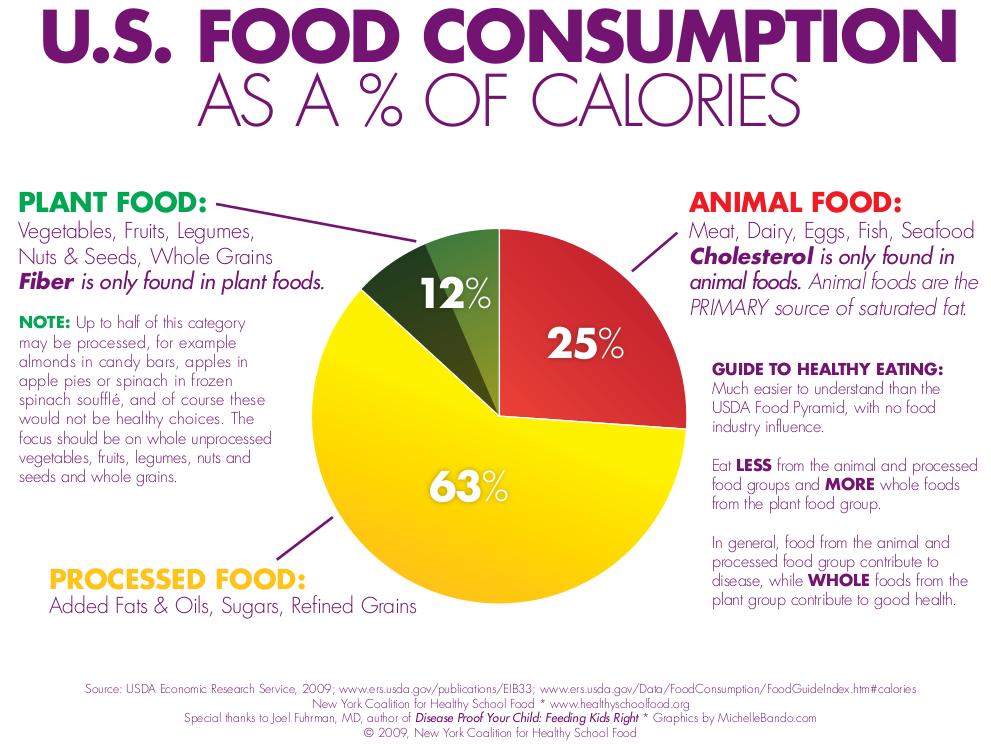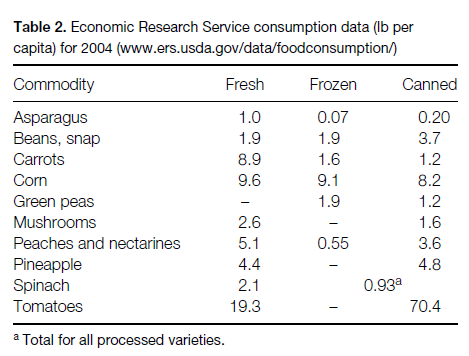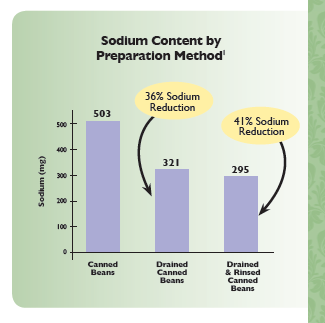You’re tired, you didn’t plan for dinner, and your fridge isn’t stocked with any fresh vegetables.
You could open that bag of frozen broccoli…but isn’t that the nutritional equivalent of a cardboard box? Instead, you order a supreme pizza with extra cheese and a side of rationalization.
Was that really the best choice?
Canned/frozen vegetables and fruits in context
It might seem hard to believe, but canned/frozen vegetables/fruits are some of your best options from a “nutrients per food dollar” perspective. Even the FDA and IFIC have reported that canned/frozen vegetables/fruits have nearly the same nutrient profiles as fresh.
Most people believe that canning or freezing vegetables/fruits depletes their nutrients. But we also need to remember that only 12% of the standard American diet is comprised of whole plant foods. Yikes.

Adding a bag of frozen cauliflower to the above diet isn’t going to make it worse, that’s for sure.
Low vegetable/fruit intake is #6 on the WHO‘s list of 20 risk factors for mortality worldwide. Sufficient consumption of these foods could save up to 2.7 million lives each year.
So let’s get three things straight right off the bat.
- Fruits and vegetables are good for you.
- Canned or frozen fruits or vegetables are not much worse than fresh.
- Considering the big picture of the Western diet, any fruits and vegetables — in any format — are probably an improvement.
Why preserve fruits and vegetables?
Seasons change. So unless you have a home garden capable of supplying 10 servings of fresh vegetables/fruits year round, you may want to introduce yourself to canned/frozen options.
Fresh vegetables/fruits are susceptible to moisture loss and microbial spoilage. Refrigeration can slow this process, but canning/freezing puts a halt on moisture loss, nutrient loss, and growth of micro-organisms.
Many folks already prefer to buy certain types fruits and vegetables in preserved format. Below is a comparison of consumer habits. As you can see, while people prefer some things fresh (such as asparagus), they’re more likely to buy other things preserved, such as pineapple or tomatoes.

Preserving nutrients
Harvesting a vegetable/fruit separates it from the source of nutrients.
The longer a food is separated from the soil, the more nutrients are lost. Leaving fresh foods sitting around leads to nutrient losses. Food washing, peeling and cooking can also lead to further nutrient losses.
By the time you pick up a fresh vegetable/fruit at the grocery store, it might have already lost between 15-60% of some vitamins (unless purchased and consumed within 72 hours of harvest). Canned/frozen varieties of the same vegetable/fruit usually have lost no more than 20% of these vitamins.
Check out this table comparing the vitamin C content of fresh and frozen peas, spinach, and French beans.
Quantity of Vitamin C(mg/100g)
| Freshly picked peas | 22.1 |
| Fresh peas (after 2 days) | 14.1 |
| Frozen peas | 20.2 |
| Freshly picked spinach | 17.0 |
| Fresh spinach (after 2 days) | 4.1 |
| Frozen spinach | 14.0 |
| Freshly picked French beans | 16.4 |
| Fresh French beans (after 2 days) | 7.9 |
| Frozen French beans | 14.3 |
The nutrient content of preserved plant foods depends on four factors:
- Time of harvest
- Location
- Growing conditions
- Cooking method
Freezing is one of the best methods for preserving as many nutrients as possible. When plant foods are frozen, they are often blanched (briefly immersed in boiling water) to suppress the growth of microbes and retain color. Then they’re flash frozen (immediately taken in small batches to freezing).
VIDEO: Frozen foods – behind the scenes
Blanching can make some nutrients (including phytochemicals) more bioavailable. Some data indicate that certain nutrients are actually higher in frozen vegetables than in fresh or canned. Even in delicate blueberries, the antioxidants aren’t much different between canned, frozen, fresh, and dried.
Vitamins
Regardless of whether a food is canned, frozen or fresh, cooking can leach out nutrients, especially vitamins B1 and C, with vitamin C being the least stable. Don’t overcook foods if you want to maximize nutrient intake. Microwaving and steaming seem to help retain the most nutrients.
Vitamins A, D, and E, along with most carotenoids, are fat-soluble, making them resistant to degradation from blanching and washing. However, they’re still prone to oxidation with the presence of light, heat and oxygen. This can be minimized with canning/freezing (compared to purchasing fresh, storing at home, and then preparing).
Further, we tend to absorb carotenoids better after eating cooked foods rather than raw. So, canned/frozen foods might offer a better source for these nutrients.
Minerals
Minerals are resilient. They’re not destroyed by light, heat, or oxygen. Thus, noticeable mineral losses from canned/frozen foods are rare.
Minerals are removed from foods by leaching into the cooking water (tends to be negligible) and mechanical processing (e.g., the stems of mushrooms are often removed before canning them).
Canned vegetables may have higher levels of calcium and other minerals due to the uptake from hard water during processing. Iron levels can increase and copper levels can decrease when foods are canned in tin-plated steel.
Fiber
Fiber losses occur only when there is mechanical separation of the food (e.g., removal of peels, skins, stems, etc.), such as with canned asparagus and tomatoes. The fiber content in canned beans/legumes is the same as fresh.
Concerns about preserved foods
What about the environment?
Freezing/canning foods takes energy, resources, and fuel. The act of keeping a freezer the proper temperature takes energy, and the coolant for freezers can harm the environment.
Most of the aluminum or tin-plate steel that cans are made from can be recycled. This is superior to most frozen foods in plastic bags (some frozen foods are in biodegradable bags – like Stahlbush Island).
What about BPA in canned food?
Some companies are committed to BPA free can linings (like Eden Organics). Check with the company whose products you buy. More information on BPA in canned foods can be found here.
What about nitrates/nitrites?
Sodium nitrates/nitrites are sometimes added to canned meats/fish to prevent spoilage. When combined with amino acids in an acidic environment (i.e., your stomach), they can form into nitrosamines, which have been linked to the development of cancer. For more, see All about Cooking and Carcinogens. Many companies are now using alternative methods of preservation – so check ingredients.
What about sugar, salt and preservatives?
This is an important consideration, especially for canned foods. For instance, many fruits are canned in sugar solutions (look for “syrup”, “juice”, or “sweetened” on the label), while many vegetables (such as tomatoes) are high in sodium. Some canned vegetables are also packed in oil. As always, read labels carefully!
One option is to drain and rinse canned items before eating them. Draining/rinsing canned beans is very effective at reducing salt. One experiment resulted in a 41% reduction in sodium per serving, from 503 mg to 295 mg.

And I know this is shocking, but you can also buy low sodium, no-salt added, preservative free, no-sugar-added options.
What about food waste?
You know that moldy asparagus in the back of your fridge? That’s food waste.
We waste about 25% of all the food we purchase for home (for more see All About Food Waste). With frozen/canned foods, you don’t have to worry about food waste since the stems, stalks, peels and rinds have already been removed. Plus, you just use what you need at the time you need it.
Summary and recommendations
Who likely has a leaner and healthier body?
- The person who eats 2 bowls of frozen cauliflower each day?
- The person who eats 2 bags of chips/pretzels instead of vegetables because they feel like frozen/canned options suck?
No matter whether they’re fresh, frozen, or canned – just eat more vegetables and fruits. Frozen cauliflower will likely benefit your body more than a moon pie.
Fresh veggies/fruits may taste better than frozen/canned, but only when they are local and straight from the soil do they contain substantially more nutrients. Fresh foods lose nutrients over time, while the nutrient content of frozen foods in particular is better than we might expect.
When heating foods, try to steam, stew, or microwave for nutrient retention. Don’t overcook.
Read labels for any ingredients you don’t want, such as sugar, salt, preservatives, and/or oils. Drain and rinse canned foods if necessary.
To make sure the planet doesn’t explode in the next few months, try this:
- Stock your home freezer well (this will save energy).
- Keep your freezer at -18 C (0 F).
- Recycle cans from canned foods.
- Try to find frozen foods in biodegradable bags.
- Try to find BPA free canned foods.
Extra credit
Do you tend to get the same three produce items? Canned and frozen options can increase your variety.
Simply allowing frozen foods to thaw at room temperature won’t destroy any potential bacteria that are on the food.
The liquids from defrosted frozen food can contain nutrients.
Most people didn’t have freezers to store frozen food until the late 1940s.
Nutrient labels on packages aren’t always reliable since nutrients are influenced by washing, peeling, heating, oxygen, water losses, and further preparation at home.
Fruits usually aren’t blanched due to their delicate structure.
Frozen legumes can contain slightly more nutrients than their canned counterparts.
If your freezer is near a heat source (like your oven), operating costs can increase by nearly 50%.
References
Click here to view the information sources referenced in this article.
Ready to go from a skilled coach to an exceptional one—in just 20 weeks?
The PN Level 2 Master Health Coaching Certification fast-tracks your growth—giving you the skills, experience, and confidence most coaches take 5–10 years to develop.
This is NOT a “Level 2” nutrition course. It’s NOT about meal plans or macros. It’s an advanced, practice-based program that prepares you to:
🔑 Understand your clients on a deeper level—beyond food and fitness—and help them create lasting change.
🔑 Navigate complex situations like mental health, stress, and emotional setbacks with confidence.
🔑 Master behavior change so clients stay committed—no matter what life throws their way.
You’ll learn from your mentors—PN’s industry-leading coaches—through a blend of weekly live mentorship, self-study, and real-world coaching practice that accelerates your growth.
Why it matters:
Level 2 is NBHWC-approved, so graduates are eligible for:
- National Board Certification through the NBHWC
- Professional membership with the Health Coaches Alliance (HCA)
These credentials expand your career opportunities, build your credibility, and set you apart in a growing—and crowded—field.
Don’t spend a decade learning what you can master in 20 weeks.


Share